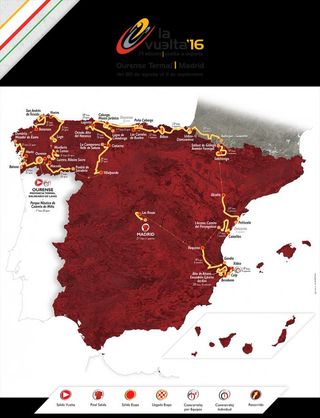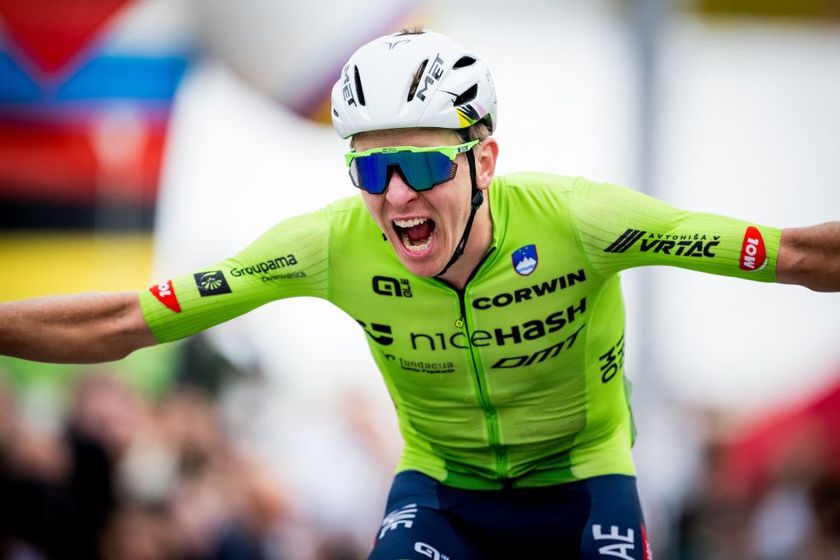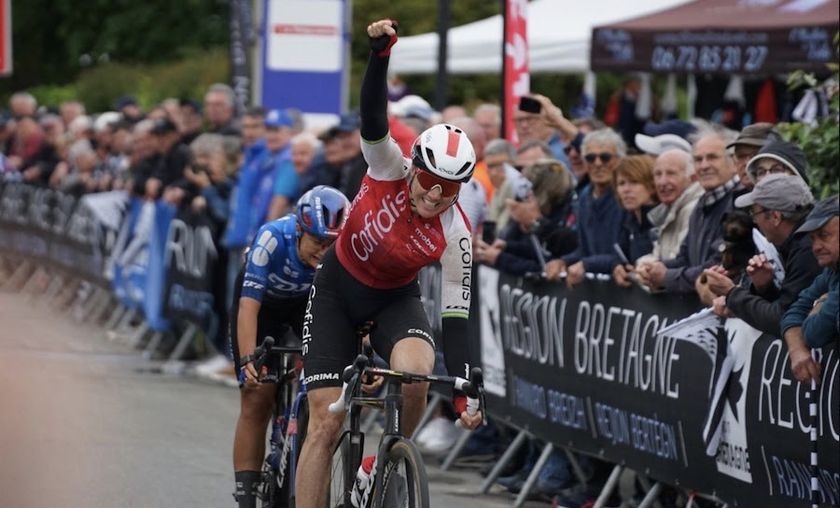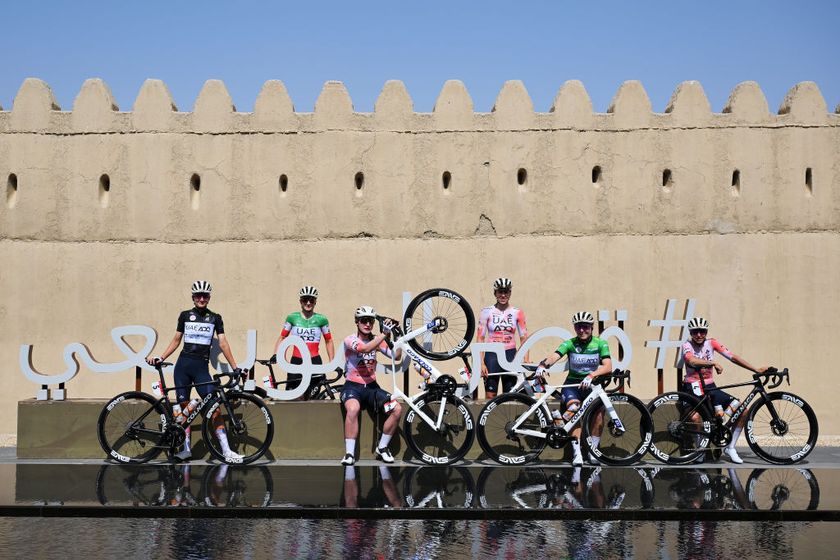Vuelta a Espana 2016 race route revealed
10 summit finishes and tough second week likely be decisive



























The Vuelta a Espana’s official launch today has confirmed that with the hardest stages packed into the second week, an outright winner could be decided long before the peloton finally reaches Madrid and the Vuelta’s final stage on September 11th.
More details of 2016 Vuelta a Espana opening stages leaked
Ten summit finishes for Vuelta a Espana in 2016
2016 Vuelta a Espana to feature Pena Cabarga summit finish
Last two 2016 Vuelta a Espana summit finishes revealed
Will Contador ride the Vuelta a Espana in his final season?
Vuelta a Espana: Landa says the Aubisque is the toughest stage of them all
Contador says 2016 Vuelta is 'not yet ruled out'
Team Sky to replace Jaguar with Ford cars in 2016 - News Shorts
The 2016 Vuelta a Espana will have ten summit finishes, one more than in 2015. Unlike last year’s race, where all the summit finishes were crammed into the first two weeks, they will be more spread out, starting with the ultra-steep Mirador de Ézaro in northwesterly Galicia on stage 3 and concluding on stage 20 at the long, draggy Alto de Aitana, nearly 1,100 kilometres away.
The first week of racing will be on rugged roads through the region of Galicia and “there’s not a metre of flat in this area,” pointed out 1986 Vuelta winner and local star Alvaro Pino, starting with a medium-length 29 kilometre team time trial, that will likely see some initial gaps emerge. But the Vuelta’s second week will probably prove the most decisive for the overall classification.
That second week’s action starts on stage 10 with an ascent and summit finish at Lagos de Covadonga in the northern Picos de Europa mountain range. Lagos de Covadonga is widely rated as one of Spain’s most difficult single climbs and has regularly featured in la Vuelta since the early 1980s. This time round, it is the first of the 2016 Vuelta’s three Special Category final climbs.
Then after a rest day, stage 11 runs along the Asturian coastline through tricky, constantly undulating terrain that concludes with an ascent to Peña Cabarga, scene of Chris Froome’s memorable duel against 2011 Vuelta winner and local rider Juan Jose Cobo, and also where Vasil Kiryenka took Sky’s one stage win in the 2013 Vuelta a Espana.
A third straight tough day of racing takes the Vuelta into the Basque city of Bilbao on stage 12, with a double assault of the Alto del Vivero in the closing kilometres, and a fourth hard day on stage 13 - the longest of the 2016 Vuelta at 212 kilometers - runs through constantly undulating terrain and has no less than seven classified climbs, finishing in the Navarran hill town of Urdax, close to the French frontier.
The Vuelta a Espana’s hardest mountain stage of all though is stage 13. Four major Pyrenean climbs - the Inharpu, the Pierre de Saint-Martin, where Froome effectively won the 2015 Tour de France - the Marie-Blanque and the 17 kilometre ascent to the Aubisque in France could well make this the day the Vuelta is won or lost.
Get The Leadout Newsletter
The latest race content, interviews, features, reviews and expert buying guides, direct to your inbox!

A final summit finish in the Pyrenees to the comparatively easy Formigal summit finish then follows on stage 14, and although a very short stage, just 120 kilometres long, as the sixth consecutive day of climbing, it may yet do some serious damage.
Following a short but very steep four kilometer ascent to Mas de la Costa on stage 17, the race’s only individual time trial, on stage 19, is 39 kilometres long, which is exactly the same length as the one in Burgos in the third week of the 2015 Vuelta.
Last year’s chrono left the race hanging on a knife-edge for the final showdown through the sierras of Madrid, and organisers will be hoping that it will do so again in the Alto de Aitana climb in Alicante region on stage 20. Last tackled in the 2009 Vuelta when Cadel Evans briefly took the lead, the 22.3 kilometre long Aitana ascent is never excessively steep - on the usual route to the top, its hardest gradient is around nine per cent. But it will come at the end of three weeks, the very hot weather in that area could take its toll too, and as the final chance to shake up the 2016 Vuelta’s overall classification, the sparks will surely fly.
Missing from la Vuelta is - for a fourth year running - the Alto de Angliru, Spain’s single most difficult climb and which was last tackled in 2013, and after two years in which the region featured heavily, there are no stages at all in the country’s largest and most southerly region of Andalucia, either. Barring the last day’s 450 kilometre trek up to Madrid, almost all of the long, unpopular, transfers of previous years have disappeared, too. No stage, not even the one up the Aubisque, is comparable to the ‘mega-mountain’ stage through Andorra last September, widely described as La Vuelta’s hardest ever day of climbing. For the sprinters, there are around six possible finishes in total, the same as in 2015.
One final note, for those wondering about the opening team time trial, rather than taking any risks with the kinds of sand or cement surfaces which led to such a controversial and bizarre start to the Vuelta a Espana in 2015, this year’s first stage TTT will be held entirely on normal, tarmacked roads. And given it will be held in Galicia, statistically Spain’s wettest region, nobody can blame the Vuelta organisation or the UCI if it rains.
2016 Vuelta a Espana: Race stages
Saturday August 20th: stage 1: Balneario Laias - Castrelo de Miño (Ourense), 29.4 kms (TTT)
Sunday August 21st: stage 2: Ourense - Baiona, 159 kms, Hilly.
Monday August 22nd: stage 3: Marín (Pontevedra) - Mirador Ézaro, 170 kms. Hilly, summit finish 1.
Tuesday August 23rd: stage 4: Betanzos - San André de Teixidó, 161 kms. Hilly, summit finish 2.
Wednesday August 24th: stage 5: Viveiro - Lugo, 170 kms.
Thursday August 25th: stage 6: Monforte de Lemos - Luintra, 163 kms.
Friday August 26th: stage 7: Maceda - Puebla de Sanabria, 158.3 kms.
Saturday August 27th: stage 8: Villalpando (Zamora) - La Camperona, 177 kms. Mountainous, summit finish 3.
Sunday August 28th: stage 9: Cistierna - Alto de Naranco, 165kms. Summit finish 4.
Monday August 29th: stage 10: Lugones - Lagos de Covadonga, 186.6kms. Mountainous, summit finish 5.
Tuesday August 30th: Rest Day 1.
Wednesday August 31st: stage 11: Colunga - Peña Cabarga, 168.6kms. Summit finish 6.
Thursday September 1st: stage 12: Los Corrales de Buelna - Bilbao, 193.2kms.
Friday September 2nd: stage 13: Bilbao - Urdax, 212.8kms. Hilly.
Saturday September 3rd: stage 14: Urdax - Aubisque, 195.6kms. Mountainous, summit finish 7
Sunday September 4th: stage 15: Sabiñanigo - Formigal, 120kms. Mountainous, summit finish 8.
Monday September 5th: stage 16: Alcañiz - Peníscola, 158kms.
Tuesday September 6th: Rest Day 2.
Wednesday September 7th: stage 17: Castellón - Mas de la Costa, 173.3kms. Hilly, summit finish 9.
Thursday September 8th: stage 18: Requena - Gandía, 191kms.
Friday September 9th: stage 19: Xàbia - Calpe, 39kms (ITT).
Saturday September 10th: stage 20: Benidorm - Alto de Aitana, 184.5kms. Mountainous, summit finish 10.
Sunday September 11th: stage 21: Las Rozas - Madrid, 102.5kms.
Alasdair Fotheringham has been reporting on cycling since 1991. He has covered every Tour de France since 1992 bar one, as well as numerous other bike races of all shapes and sizes, ranging from the Olympic Games in 2008 to the now sadly defunct Subida a Urkiola hill climb in Spain. As well as working for Cyclingnews, he has also written for The Independent, The Guardian, ProCycling, The Express and Reuters.
Most Popular





